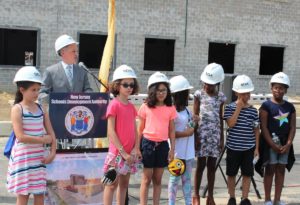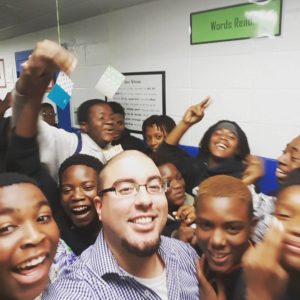Chalkbeat , a nonprofit news organization covering public education, originally published this post as “KIPP New Jersey students will learn remotely until January after network delays reopening classrooms” Sign up for their newsletters here: ckbe.at/newsletters.
One of New Jersey’s largest charter school networks says it will now keep classrooms closed until January, a delay that means thousands of students will have spent nearly a year learning from home.
KIPP charter schools in Newark and Camden, which collectively enroll about 7,000 students, recently told families they are pushing back the start of in-person learning from this month to late January. School leaders cited a recent uptick in coronavirus cases and ongoing ventilation upgrades, among other factors.
About a third of New Jersey school districts started the school year remotely after Gov. Phil Murphy allowed schools with safety concerns to postpone reopening classrooms. Newark’s traditional and charter schools were among those that started virtually with plans to begin in-person learning this month or next.
Now, KIPP’s delay raises the question of whether other schools will also put off in-person learning. And it means that KIPP students will not set foot in a classroom until 10 months after the pandemic shut down school buildings in March.
“We did not make this decision lightly given how much we want to see our students back in our classrooms,” said Joanna Belcher, executive director of KIPP’s Newark schools, in a letter to families on Friday. She added that the “health and safety of our students and staff remain our top priority.”
Across New Jersey, whether students have returned to classrooms varies from district to district and day to day.
About 400 districts began the school year with a hybrid of in-person and at-home learning, though some schools have had to temporarily close classrooms after teachers or students tested positive for the virus. Roughly 280 districts started the year fully remote, including Newark’s charter schools and the traditional school district, which tentatively expects to resume classroom learning in November.
A majority of KIPP families, like many Newark parents, said in surveys this summer that they preferred remote learning due to safety concerns. KIPP, like many other charter and traditional schools that opened virtually this fall, revamped its online program to make it more demanding and engaging.
Still, some experts have expressed alarm at the potential academic and social consequences of keeping students home for so long, and have pointed to early evidence that COVID-19 outbreaks in schools have been limited. New Jersey has identified 16 outbreaks in schools among the hundreds of districts offering in-person classes this fall, Murphy said Thursday.
Amid concerns about potential learning loss caused by extended remote learning, a Chalkbeat/Associated Press analysis found that Black and Hispanic students nationwide were more likely than their white peers to start the year online. The same racial divide has emerged in New Jersey, according to a new analysis by researcher Mark Weber published by New Jersey Policy Perspective. Students in districts that began the year with all-remote learning are disproportionately Black and Hispanic, while white students are more likely to be enrolled in districts that offered at least some in-person instruction, Weber found.
KIPP New Jersey students, almost all of whom are Black or Hispanic, will continue learning remotely until Jan. 11. Then the school plans for them to return to school in small groups to meet their peers and learn safety procedures, according to the letters sent to families. KIPP plans to resume in-person classes Jan. 25, when students would spend one to four days per week in classrooms depending on how many families opt for hybrid learning.
This staggered start to in-person learning “will help ensure that we can have a safe and smooth start to Quarter 3 instruction,” Belcher wrote.
The KIPP leaders gave a few reasons for the monthslong delay in reopening classrooms.
The schools are “revamping” their ventilation systems, which experts suggest could help reduce the spread of the virus. The network also expects “conditions surrounding the virus,” such as testing availability and treatment options, to improve by January, Belcher wrote. Drew Martin, the head of KIPP Camden, added that the extra time will allow schools to purchase additional protective gear and laptops.
“Given that cases are continuing to rise in New Jersey, we want to ensure that we are as prepared as we can possibly be to reopen safely,” he wrote.
Dominique Green has three children in KIPP Newark schools. Remote learning has been exhausting for Green, who works overnight at a food-delivery company then sets up her children on their computers each morning before she can sleep. She said her children, who range from kindergarten to fifth grade, miss seeing their friends and have trouble focusing during online classes.
“I’m tired and they’re frustrated,” she said Thursday. “This computer stuff is too much.”
Green is hoping her children will be able to attend school in person full-time when KIPP reopens classrooms next year. In the meantime, she worries that distance learning is leaving some students behind.
“I think a lot of kids might fall back by the time they step back in school,” she said.





